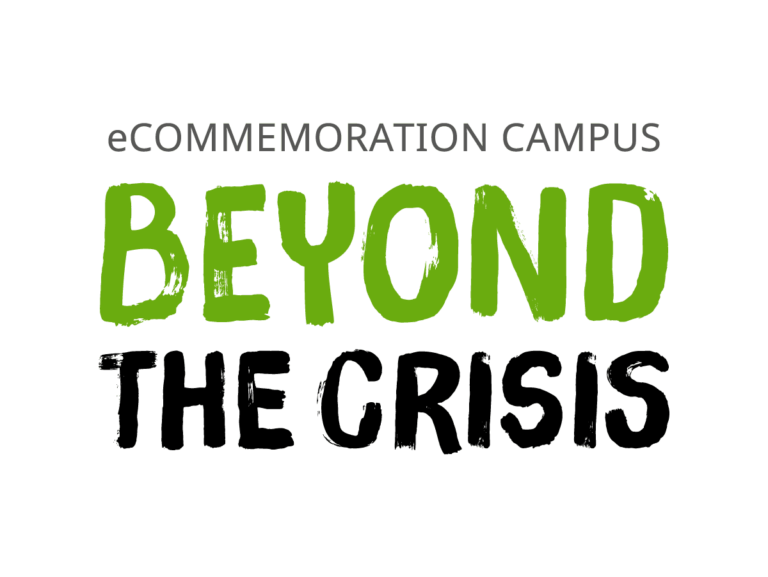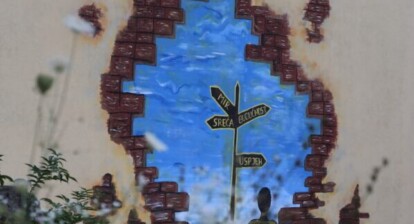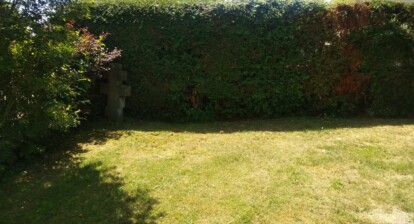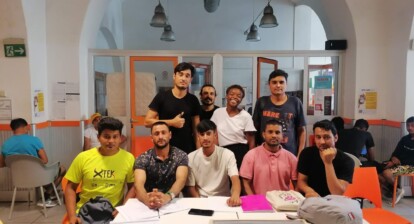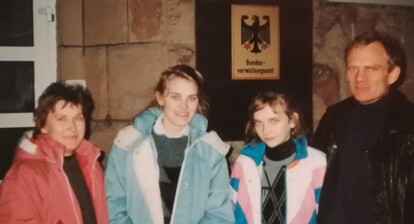LIFE AND HOPE IN THE AGE OF CRISIS
The Experiences of Four Young Ukrainians
Photograph: MaxxjaNe.
By Taras, participant of the eCommemoration Campus 2020
"Age of Crisis" – probably this is how you can best describe the recent history of Ukraine. In fact, we are talking about living in constant stress, with short periods of well-being, which can collapse at any moment, often for geopolitical reasons. It is extremely difficult to plan something in such conditions. And hope often becomes the only salvation. Four Ukrainians who experienced war, flight and the pandemic talk about how they survived the most critical periods of their lives.
Bright past and severe crises
Ukrainians had bright and inspiring pages of the past in the times of Kyivan Rus (IX-XIII centuries), Galicia-Volyn principality (1199-1349), the Cossack state (1648-1764) or the Ukrainian People's Republic (1917-1921). These periods alternated with centuries of stateless existence due to occupation by neighboring countries. All this, including the horrors of the communist era and the extermination of millions of Ukrainians during wars, several Holodomors and repressions, led to the fact that our country began its modern existence in 1991 virtually blindly, with no "middle class". As a result, we received all possible "crises of growth" that most Europeans experienced centuries ago.
Add to this the economic crises of the 1990s, 2008-2010, 2014-2015, the invasion by the Russian Federation in 2014, with the occupation of Crimea and parts of Donetsk and Luhansk regions, the coronavirus pandemic, and the passion for populism rooted in the mentality of many Ukrainians, which is gladly used by the authorities without thinking about the consequences, and you will get a really explosive mixture.
Add to this the economic crises of the 1990s, 2008-2010, 2014-2015, the invasion by the Russian Federation in 2014, with the occupation of Crimea and parts of Donetsk and Luhansk regions, the coronavirus pandemic, and the passion for populism rooted in the mentality of many Ukrainians, which is gladly used by the authorities without thinking about the consequences, and you will get a really explosive mixture.
I decided to talk about personal recipes for fighting crises with young people who were born or raised in independent Ukraine. Some of them are called "children of the 90's", referring to the period of total economic collapse; others, unfortunately, became "children of war". How different is their perspective on these events? And can a crisis become a "lucky ticket" in life?
I
Viktor (20 years old, Kyiv)
Brief information: Viktor was born in Alchevsk, Luhansk region. In September 2014, in connection with the occupation of his hometown by pro-Russian militants, he moved with his mother to Kyiv. In 2017 he entered the local National Aviation University. At the same time, he works at the car wash.

"I regret absolutely nothing"
"When I am asked about moments of crisis, it is really difficult for me to say something about it. Not because they don't exist. Any difficulties in life I consider in terms of the possibility or impossibility of changing something. And then they become just tasks. If the problem can't be solved, then there is no point in worrying.
Even the war that came to my home did not become a traumatic tragedy for me. And here the reason is also to be found in certain events before its beginning. I've changed schools six times and lived in two cities. My ability to adapt to a new team has developed since early childhood. And in this sense, I had nothing to lose when I moved to the capital.
There was no tangible property in my family, but we had a thirst for adventure. For a child from the province, who has traveled only 100 kilometres to the sea twice in his life, departure was even desirable. Although, if I had known then that I was seeing my dad for the last time, I would have worried much more.
For my mom, of course, it was harder. I left two months earlier, and she was left alone in the occupied territories. She still had a job then, but when the question of the beginning of the new school year arose, there were few options left.
Even the war that came to my home did not become a traumatic tragedy for me. And here the reason is also to be found in certain events before its beginning. I've changed schools six times and lived in two cities. My ability to adapt to a new team has developed since early childhood. And in this sense, I had nothing to lose when I moved to the capital.
There was no tangible property in my family, but we had a thirst for adventure. For a child from the province, who has traveled only 100 kilometres to the sea twice in his life, departure was even desirable. Although, if I had known then that I was seeing my dad for the last time, I would have worried much more.
For my mom, of course, it was harder. I left two months earlier, and she was left alone in the occupied territories. She still had a job then, but when the question of the beginning of the new school year arose, there were few options left.
Difficulties of the new life
On September 3, 2014, I moved to Kyiv. The first trip around the city was a complete shock to me. I was amazed at how high everything around was. I had never seen houses before as high as 16 floors. That's what I remember in the first place.
In general, it was very difficult to adapt in my first Kyiv school. I came there when the semester had been going on for a month already, and I had to catch up a lot. The class knew about my arrival in advance. But the specifics of my appearance at the time greatly ruined my plans. I looked a few years younger than my peers then, and I was also short. For schoolchildren that's like a sentence. Nobody wanted to take me seriously, and they were sceptical of me. For three months before my arrival in the city, the propaganda machine has been loudly declaring that people from the East are monsters and should be eradicated.
But over time I managed to make friends. Of course, now I think that I managed to overcome these teenage problems by myself, but then it was a very powerful blow to my self-esteem, and my personality in general.
In general, it was very difficult to adapt in my first Kyiv school. I came there when the semester had been going on for a month already, and I had to catch up a lot. The class knew about my arrival in advance. But the specifics of my appearance at the time greatly ruined my plans. I looked a few years younger than my peers then, and I was also short. For schoolchildren that's like a sentence. Nobody wanted to take me seriously, and they were sceptical of me. For three months before my arrival in the city, the propaganda machine has been loudly declaring that people from the East are monsters and should be eradicated.
But over time I managed to make friends. Of course, now I think that I managed to overcome these teenage problems by myself, but then it was a very powerful blow to my self-esteem, and my personality in general.
Viktor (second from right in the photo) during a visit to the Museum of Television in Kyiv (2016) / Photograph: Khrystyna Muzychuk.
Viktor (far right in the photo) during the creation of an art project on stereotypes about IDPs (internally displaced persons) (2016) / Photograph: Khrystyna Muzychuk.
Viktor (in the centre in the photo) during photo courses from the project "Integration through Dialogue" for children affected by war (2017) / Photograph: Anastasiia Zazuliak.
A moment of nostalgia
Then there was participation in projects, start of studies at the university, various jobs, independent living ... . Even the COVID-19 pandemic did not affect my lifestyle much. I hadn't visited different events actively before because of the workload. Now the only difference is that I have to wear a mask all the time.
When I think about that difficult period of 'acceptance' after my arrival in Kyiv, I regret absolutely nothing. All the things that happened to me made me who I am now. And they got me to know people who are dear to me. Remembering that time, I can feel a moment of nostalgia. Although, there is one point: I wouldn't start smoking again. After all, it was a waste of money that would have been better used for myself or loved ones. But something like that one only understands after a certain time".
When I think about that difficult period of 'acceptance' after my arrival in Kyiv, I regret absolutely nothing. All the things that happened to me made me who I am now. And they got me to know people who are dear to me. Remembering that time, I can feel a moment of nostalgia. Although, there is one point: I wouldn't start smoking again. After all, it was a waste of money that would have been better used for myself or loved ones. But something like that one only understands after a certain time".
II
Anastasiia (20 years old, Lviv)
Brief information: Anastasiia was born in Luhansk. In 2014, in connection with the occupation of her hometown by pro-Russian militants, she moved with her parents and sister to Sievierodonetsk, Luhansk region, in the territories controlled by Ukraine. Since 2017 she has been studying at the Faculty of History of Ivan Franko National University of Lviv.

"Often obstacles provide great opportunities"
"When I look back and think about when exactly my usual life ended, I can clearly name this event. After all, it all started with the appearance of the first barricades near my school in Luhansk. My parents had an open pro-Ukrainian position, so we left the city immediately, just not to run into danger. Then began what became a personal crisis for me.
This phase of my life lasted for three years, from 2014 to 2017. It consisted of five relocations, five different schools, misunderstandings with peers, constant tears, continuous health problems due to stress. In my memory, all of this time is "darkness". Not everyone experienced this "beginning of a new life" so hard, but for me it was very difficult. Now I understand that this was influenced by the hyperbolized adolescent perception of reality on the negative side, and the complete isolation from the outside world.
All this time (and now also) my parents were the closest people to me. Mom and dad, due to the start of hostilities in Donbass, lost everything they worked for half of their lives. I can only imagine how bad it was for them. But they held on for my sister and me; they couldn't afford to despair like I did.
This phase of my life lasted for three years, from 2014 to 2017. It consisted of five relocations, five different schools, misunderstandings with peers, constant tears, continuous health problems due to stress. In my memory, all of this time is "darkness". Not everyone experienced this "beginning of a new life" so hard, but for me it was very difficult. Now I understand that this was influenced by the hyperbolized adolescent perception of reality on the negative side, and the complete isolation from the outside world.
All this time (and now also) my parents were the closest people to me. Mom and dad, due to the start of hostilities in Donbass, lost everything they worked for half of their lives. I can only imagine how bad it was for them. But they held on for my sister and me; they couldn't afford to despair like I did.
"Life is a struggle"
3.5 years ago I moved for the sixth time, entering the university in Lviv. I had friends here at that moment, but the closest people were at the other end of the country. I was afraid that it would be difficult for me, that I might not be accepted by my classmates.
But the loneliness pulled me out of depression, forced me to 'create' myself and my environment 'from scratch'. Living independently in a distant city, the later pandemic and the challenges associated with it, gradually led me to realize that our whole life is a struggle. Fighting fears, injustice, yourself. Apparently, this is my special path, necessary for my spirit.
At some point, I realized that being in a 'social cocoon' would not lead to anything good. So, I forced myself to be more open, persistent. And new friends and acquaintances dispelled my old fears.
These are just the first steps. I'm not a stress-resistant person at all, and I don't know how to deal with negative thoughts. Unfortunately, our country does not pay enough attention to the state of mental health and does not consider disorders like these as a problem. So, the only thing I can do is convince myself that sooner or later the dark times will be exchanged by good ones. And, of course, to try to help this.
But the loneliness pulled me out of depression, forced me to 'create' myself and my environment 'from scratch'. Living independently in a distant city, the later pandemic and the challenges associated with it, gradually led me to realize that our whole life is a struggle. Fighting fears, injustice, yourself. Apparently, this is my special path, necessary for my spirit.
At some point, I realized that being in a 'social cocoon' would not lead to anything good. So, I forced myself to be more open, persistent. And new friends and acquaintances dispelled my old fears.
These are just the first steps. I'm not a stress-resistant person at all, and I don't know how to deal with negative thoughts. Unfortunately, our country does not pay enough attention to the state of mental health and does not consider disorders like these as a problem. So, the only thing I can do is convince myself that sooner or later the dark times will be exchanged by good ones. And, of course, to try to help this.
The photo shows the typical condition of Anastasiia during her stay in Sievierodonetsk (August of 2016) / Photograph: Khrystyna Muzychuk.
Anastasiia (far left in the photo) during a walk through evening Lviv with her university friends in the "pre-quarantine" period (2019) / Photograph: Anastasiia.
Celebrating the 20th anniversary with university friends (Anastasiia in the photo is second from the left in the first row) (February of 2020) / Photograph: Viktoriia Labynska.
Anastasiia during one of the rare meetings with her mother (2020) / Photograph: Anastasiia.
"Life will definitely only get better"
Even now, in order not to get depressed because of troubles, I keep myself busy: learning, projects, learning English, games, TV series, and photography. Everything, the main thing is to distract me from bad thoughts. And I began to appreciate new acquaintances, communication with people, establishing new contacts, or restoring old ones. At the moment, I have a lot of friends and comrades. And I owe this to the very atmosphere of Lviv and my Alma Mater.
Thanks to these people and the desire to finally change my life, I suddenly noticed that I became a sincere, cheerful and open girl again, who likes to laugh at silly jokes and walk around Lviv in the evening with a nut cappuccino in her hands.
And now, if I had the opportunity to communicate with myself during my stay in Sievierodonetsk, I would say the following: "Do not despair! Life will definitely only get better. All the difficulties that occur are experiences that shape you as a person. Often these obstacles provide great opportunities, so take advantage of them. Learn and make every effort to develop yourself. Don't stand still, always try to want more. And of course, be yourself, defend your point of view and do not forget about personal principles. And you will see how bright life can be"."
Thanks to these people and the desire to finally change my life, I suddenly noticed that I became a sincere, cheerful and open girl again, who likes to laugh at silly jokes and walk around Lviv in the evening with a nut cappuccino in her hands.
And now, if I had the opportunity to communicate with myself during my stay in Sievierodonetsk, I would say the following: "Do not despair! Life will definitely only get better. All the difficulties that occur are experiences that shape you as a person. Often these obstacles provide great opportunities, so take advantage of them. Learn and make every effort to develop yourself. Don't stand still, always try to want more. And of course, be yourself, defend your point of view and do not forget about personal principles. And you will see how bright life can be"."
III
Anna (24 years old, Odesa)
Brief information: Anna was born in Pervomaisk of the Mykolaiv region. In 2015 she entered the Faculty of Choreography of Ivan Franko National University in Lviv. Since 2020 Anna has lived in Odesa. She works in several areas: as a choreographer, dancer, theatre actress, model, yoga coach, freelance translator.

"The main thing is to see opportunities in everything"
"When I think about my life, I understand that there were, are and will be the moments of crisis in it. After all, can this be perceived differently by a person who switched from the theatrical sphere to freelance with translation, and in the last two years has been forced to overestimate her physical, intellectual, financial and social capabilities? Even now I'm living in two cities (Odesa and Lviv), forming new goals.
Each stage of my past had its own story. Usually, it was about the rapid desire to get something, when I sacrificed for the next achievement with all my strength and ambition. And at the end I got injuries, physical illnesses or internal burns. There were crises that affected my life, but I was not able to solve them, because they affected the whole city, and even the country.
And it was at these moments that I especially appreciated the support of my close associates. Most often, they warned me about the possible consequences of my activities, such as physical injuries or diseases acquired as a result of fatigue. It was more difficult with global events, because our views often differed.
Each stage of my past had its own story. Usually, it was about the rapid desire to get something, when I sacrificed for the next achievement with all my strength and ambition. And at the end I got injuries, physical illnesses or internal burns. There were crises that affected my life, but I was not able to solve them, because they affected the whole city, and even the country.
And it was at these moments that I especially appreciated the support of my close associates. Most often, they warned me about the possible consequences of my activities, such as physical injuries or diseases acquired as a result of fatigue. It was more difficult with global events, because our views often differed.
"Independent living was the biggest chance for me"
Probably the first challenge and the biggest chance for me was independent living. It was somehow easier to start it after school in Lviv. Probably because my mentality was already common to this city, although I was born in the South. I think it was not without the influence of my genes. I easily joined the environment, found like-minded people.
The main thing is to see opportunities in everything. In Odesa, however, I am still on the way to creating an environment, and I realized that now it is much harder for me to leave behind what I gained in Lviv, my old friends, connections, works, ease and accessibility in all areas when it comes to established contacts.
The COVID-19 pandemic also had a serious impact on life. Adequate work in my artistic activity has disappeared, many theatres have closed indefinitely, there are no shootings, even teaching has gone online. This is where the importance of lability and flexibility in professional activities became clear. It was during the quarantine that I remembered a quote from a book by a German professor that I read last year that it is not expedient to have only one profession nowadays. A person must learn something new in various fields of activity. And he was absolutely right.
The main thing is to see opportunities in everything. In Odesa, however, I am still on the way to creating an environment, and I realized that now it is much harder for me to leave behind what I gained in Lviv, my old friends, connections, works, ease and accessibility in all areas when it comes to established contacts.
The COVID-19 pandemic also had a serious impact on life. Adequate work in my artistic activity has disappeared, many theatres have closed indefinitely, there are no shootings, even teaching has gone online. This is where the importance of lability and flexibility in professional activities became clear. It was during the quarantine that I remembered a quote from a book by a German professor that I read last year that it is not expedient to have only one profession nowadays. A person must learn something new in various fields of activity. And he was absolutely right.
Anna (in the foreground) during the rehearsal of the play by the theatrical troupe "Body" in the "pre-quarantine" period (2019) / Photograph: Anastasiia Okun.
Anna (second from left in the photo) during her own performance "Experiment", which was her final exam at the Faculty of Choreography (2019) / Photograph: Hryhorii Shkiria.
Anna in the "quarantine" photo shoot at the main railway station in Lviv (2020) / Photograph: Hryhorii Shkiria.
"Pandemic – opportunity to dedicate time to ourselves"
However, it was during this period that I made a number of discoveries. In particular, I found that I needed time alone with myself. That's important when you have the opportunity to structure the acquired information, analyse your health, and finally to learn to feel your body. I really didn't realise that in previous years.
I have often noticed on social media people's complaints about loneliness due to quarantine. Maybe it's their extroversion. However, I think we now have the perfect opportunity to dedicate time to ourselves. Finally, to do your self-development.
If we talk about hope in such situations, then I think everyone has it. Even in the distant and secret droplets of the soul. Unfortunately, sometimes it starts to fade.
But I do not see the point in the so-called 'positive thinking'. I'm sorry, but if you get in a car accident or plane catastrophe, what can be found positive in it? On the contrary, I am convinced of the realistic perception of the world. I believe that people's understanding of the functioning of society and the role of social ties, weighing all the risks in decision-making, are much more important than the usual hope for a miracle.
After all, it is also training the nervous system to avoid shock or depression. And then in stressful situations we will be able to react more thoughtfully and clearly, or even see hidden opportunities for ourselves.
I have often noticed on social media people's complaints about loneliness due to quarantine. Maybe it's their extroversion. However, I think we now have the perfect opportunity to dedicate time to ourselves. Finally, to do your self-development.
If we talk about hope in such situations, then I think everyone has it. Even in the distant and secret droplets of the soul. Unfortunately, sometimes it starts to fade.
But I do not see the point in the so-called 'positive thinking'. I'm sorry, but if you get in a car accident or plane catastrophe, what can be found positive in it? On the contrary, I am convinced of the realistic perception of the world. I believe that people's understanding of the functioning of society and the role of social ties, weighing all the risks in decision-making, are much more important than the usual hope for a miracle.
After all, it is also training the nervous system to avoid shock or depression. And then in stressful situations we will be able to react more thoughtfully and clearly, or even see hidden opportunities for ourselves.
The miracle of slowdowns
Looking back, I realize that I should have listened to my body more often. It were its reactions that turned out to be the most correct. No wonder we have innate instincts.
The fast pace of life, a large number of actions and ambitions lead to gradual self-destruction. Hiding behind constant deadlines, we stop hearing ourselves and understanding what we really need. People need some slowdown to establish contact with themselves and nature. Even periodic laziness is not a bad thing. It allows us to re-evaluate our priorities and goals.
And when we understand this, we will be able to remember our past as a positive story, rather than short periods between crises".
The fast pace of life, a large number of actions and ambitions lead to gradual self-destruction. Hiding behind constant deadlines, we stop hearing ourselves and understanding what we really need. People need some slowdown to establish contact with themselves and nature. Even periodic laziness is not a bad thing. It allows us to re-evaluate our priorities and goals.
And when we understand this, we will be able to remember our past as a positive story, rather than short periods between crises".
IV
Dmytro (38 years old, Uzhhorod)
Brief information: Dmytro was born in Uzhhorod. By education, he is psychologist and theologian. Married, raising a daughter. Since 2016, he has been the head of "Caritas of St. Augustine" in Transcarpathia, a branch of a Roman Catholic organization that provides charitable assistance to the most needy.

"To do something for people is inspiring"
"If I were asked to describe myself in a few words, I would recommend myself: 'I am the director of Caritas in quarantine'. The crisis or a whole chain of crises for me, our organization and the whole charity movement in Ukraine is unfolding right now.
And we are talking about both quarantine restrictions due to the coronavirus and the recent distrust of Western partners in our country. It is almost impossible to work in these conditions. And this is at a time when more and more people need our help.
I would like to talk about how my colleagues and I successfully deal with these challenges, but not everything is so simple. You can fight when your struggle is at least theoretically capable of success. In this case such a result is unlikely. The Fund I manage completely 'lives' at the expense of donors and sponsors. We do not earn anything ourselves. However, the established idea of Ukraine as a corrupt state makes it almost impossible to have productive cooperation with European organizations which, in turn, leads to a crisis in the Fund itself.
And we are talking about both quarantine restrictions due to the coronavirus and the recent distrust of Western partners in our country. It is almost impossible to work in these conditions. And this is at a time when more and more people need our help.
I would like to talk about how my colleagues and I successfully deal with these challenges, but not everything is so simple. You can fight when your struggle is at least theoretically capable of success. In this case such a result is unlikely. The Fund I manage completely 'lives' at the expense of donors and sponsors. We do not earn anything ourselves. However, the established idea of Ukraine as a corrupt state makes it almost impossible to have productive cooperation with European organizations which, in turn, leads to a crisis in the Fund itself.
Difficult to "fight"
To be completely honest, it should be noted that the reluctance of donors to cooperate with Ukraine is also explained by the 'uncleanliness' of many charitable organizations that emerged in the wake of the rise of the volunteer movement in recent years. However, this nuance does not change the essence of the matter.
It is really difficult to 'fight' the crisis under these conditions when there are people in need, there are their problems, but there is no way to help them. But, in addition to such difficulties, there are also intangible, interpersonal problems. Probably the hardest. When the irreplaceable people you hoped for the most are leaving you. It broke me.
And really, almost the only thing that often helps to stay afloat is hope. Hope for a successful project, hope that we will once again be able to help people on our own, we will be able to organize an important action for those who are in trouble, even without money from the outside. And it is at such moments that the help of loved ones is really invaluable.
And when you manage to do something for people, especially at such a difficult time for everyone, it's inspiring. And it makes you realize that everything you do is not in vain.
Many things can be mentioned. I received the Fund empty. I had to raise it from scratch, recruit a team, write, defend and implement projects. I don't know whether I did that well or not, but the experience was definitely huge.
It is really difficult to 'fight' the crisis under these conditions when there are people in need, there are their problems, but there is no way to help them. But, in addition to such difficulties, there are also intangible, interpersonal problems. Probably the hardest. When the irreplaceable people you hoped for the most are leaving you. It broke me.
And really, almost the only thing that often helps to stay afloat is hope. Hope for a successful project, hope that we will once again be able to help people on our own, we will be able to organize an important action for those who are in trouble, even without money from the outside. And it is at such moments that the help of loved ones is really invaluable.
And when you manage to do something for people, especially at such a difficult time for everyone, it's inspiring. And it makes you realize that everything you do is not in vain.
Many things can be mentioned. I received the Fund empty. I had to raise it from scratch, recruit a team, write, defend and implement projects. I don't know whether I did that well or not, but the experience was definitely huge.
"Caritas of St. Augustine" team during the project of supporting children affected by war in Ukraine (Dmytro is on the far left in the photo) (2017) / Photograph: Anastasiia Zazuliak.
The photographer captured Dmytro (far left in the photo) and his colleagues during a short break during a large-scale project after several days without sleep (2017) / Photograph: Anastasiia Zazuliak.
Members of "Caritas of St. Augustine" during the daily delivery of free lunches for the most needy (2017) / Photograph: Anastasiia Zazuliak.
"Listen to teammates"
What 'discovery' did I make for myself? Apparently, that you should never give up. That you need to appreciate those friends who were with you in the hardest times. Having discovered that everyone is afraid to make independent decisions, and that I am not unique in it. Without all this, I cannot imagine the present.
Of course, now it's hard to list all the discoveries which bring the work to the Charitable Foundation, the experience of overcoming the crises and the solution of difficult situations. Anyway, they shape you, forcing you to look at the usual things in a new way.
Perhaps the only thing I wanted to say to myself in the most difficult moments of my life is that I should not rely only on myself. I should not consider myself the smartest. And that I should appreciate and listen to teammates around me. To be grateful to those people who support, help and constructively criticize me. Because we often start to understand how important part of our lives they were only when these people are gone".
Of course, now it's hard to list all the discoveries which bring the work to the Charitable Foundation, the experience of overcoming the crises and the solution of difficult situations. Anyway, they shape you, forcing you to look at the usual things in a new way.
Perhaps the only thing I wanted to say to myself in the most difficult moments of my life is that I should not rely only on myself. I should not consider myself the smartest. And that I should appreciate and listen to teammates around me. To be grateful to those people who support, help and constructively criticize me. Because we often start to understand how important part of our lives they were only when these people are gone".

